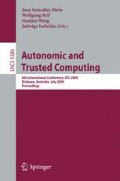Abstract
A mobile application is a software package that can be installed and executed on a mobile device. Which mobile application is more trustworthy for a user to purchase, download, install, consume or recommend becomes a crucial issue that impacts its final success. This paper proposes a computational trust model based on users’ behaviors, which assists the evaluation and management of the mobile application’s trust with user friendliness. We achieve our model through formalizing a trust behavior construct achieved from a user survey experiment though principle component analysis, reliability analysis, correlation analysis and confirmatory factor analysis. It is indicated that a user’s trust behavior is a multidimensional construct composed of three main aspects: using behavior, reflection behavior, and correlation behavior. Particularly, we simulate a set of test data to visualize the validity of the formalization.
Access this chapter
Tax calculation will be finalised at checkout
Purchases are for personal use only
Preview
Unable to display preview. Download preview PDF.
References
Marsh, S.: Formalising Trust as a Computational Concept. Doctoral dissertation, University of Stirling (1994)
Yan, Z., Prehofer, C.: An Adaptive Trust Control Model for a Trustworthy Component Software Platform. In: Xiao, B., Yang, L.T., Ma, J., Müller-Schloer, C., Hua, Y. (eds.) ATC 2007. LNCS, vol. 4610, pp. 226–238. Springer, Heidelberg (2007)
Daignault, M., Marche, S.: Enabling Trust Online. Proceedings of the Third International Symposium on Electronic Commerce (October 2002)
Muir, B.M.: Trust in Automation: Part I. Theoretical Issues in the Study of Trust and Human Intervention in Automated Systems. Ergonomics 37(11), 1905–1922 (1994)
Fishbein, M., Ajzen, I.: Beliefs, Attitude, Intention and Behavior: an Introduction to Theory and Research. Addison-Wesley, Reading (1975)
Lance, J., Hoffman, L.J., Kim, L.J., Blum, J.: Trust Beyond Security: an Expanded Trust Model. Communications of the ACM 49(7) (July 2006)
Yan, Z., Holtmanns, S.: Computer Security, Privacy and Politics: Current Issues, Challenges and Solutions. In: Trust Modeling and Management: from Social Trust to Digital Trust. IGI Global (2008)
McKnight, D.H., Cummings, L.L., Chervany, N.L.: Initial Trust Formation in New Organizational Relationships. Acad. Management Rev. 23(3), 473–490 (1998)
Bigley, G.A., Pearce, J.L.: Straining for Shared Meaning in Organization Science: Problems of Trust and Distrust. Acad. Management Rev. 23(3), 405–421 (1998)
McKnight, D.H., Choudhury, V., Kacmar, C.: Developing and Validating Trust Measures for E-Commerce: an Integrative Typology. Information Systems Research 13(3), 334–359 (2002)
Li, X., Valacich, J.S., Hess, T.J.: Predicting User Trust in Information Systems: a Comparison of Competing Trust Models. In: Proc. of 37th Annual Hawaii International Conference on System Sciences, January 2004, p. 10 (2004)
Anderson, J.C., Narus, J.A.: A model of Distributor Firm and Manufacturer Firm Working Partnerships. Marketing 54(1), 42–58 (1990)
Fox, A.: Beyond Contract: Work, Power, and Trust Relations. Faber, London (1974)
Deutsch, M.: The Resolution of Conflict: Constructive and Destructive Processes. Yale University Press, New Haven (1973)
Sheppard, B.H., Hartwick, J., Warshaw, P.R.: The Theory of Reasoned Action; A Meta Analysis of Past Research with Recommendations for Modifications in Future Research. Consumer Res. 15(3), 325–343 (1988)
Venkatesh, V., Davis, F.D.: A Theoretical Extension of the Technology Acceptance Model: Four Longitudinal Field Studies. Management Sci. 46(2), 186–204 (2000)
Muir, B.M.: Trust in Automation Part II: Experimental Studies of Trust and Human Intervention in a Process Control Simulation. Ergonomics 39(3), 429–469 (1996)
Xiong, L., Liu, L.: PeerTrust: Supporting Reputation-Based Trust for Peer-to-Peer Electronic Communities. IEEE Transactions on Knowledge and Data Engineering 16(7), 843–857 (2004)
Lee, J., Moray, N.: Trust, Control Strategies and Allocation of Function in Human-Machine Systems. Ergonomics 35(10), 1243–1270 (1992)
Yan, Z., Niemi, V., Dong, Y., Yu, G.: A User Behavior Based Trust Model for Mobile Applications. In: Rong, C., Jaatun, M.G., Sandnes, F.E., Yang, L.T., Ma, J. (eds.) ATC 2008. LNCS, vol. 5060, pp. 455–469. Springer, Heidelberg (2008)
Crocker, L., Algina, J.: Introduction to Classical and Modern Test Theory. Thomson Leaning (1986)
Gefen, D., Straub, D., Boudreau, M.: Structural Equation Modeling and Regression: Guidelines for Research Practice. Comm. AiS 7(7), 1–78 (2000)
Jiang, J.J., Klein, G.: Supervisor Support and Career Anchor Impact on the Career Satisfaction of the Entry-level Information Systems Professional. Management Inform. Systems 16(3), 219–240 (1999/2000)
Browne, M.W., Cudeck, R.: Alternative Ways of Assessing Model Fit. In: BoUen, K.A., Long, J.S. (eds.) Testing Structural Equation Models, Sage, Beverly Hills (1992)
Bentler, P.M., Bonnett, D.G.: Significance Tests and Goodness of Fit in the Analysis of Covariance Structures. Psychological Bulletin 88(3), 588–606 (1980)
Bentler, P.M.: EQS Structural Equations Program Manual. BMDP Statistical Software, Los Angeles (1989)
Anderson, J.C., Gerbing, D.W.: Structural Equation Modeling in Practice: A Review and Recommended Two-Step Approach. Psychological Bulletin 103(5), 411–423 (1998)
Carlson, D., Kacmar, K., Williams, L.: Construction and Initial Validation of a Multidimensional Measure of Work-Family Conflict. Journal of Vocational Behavior 56(2), 249–276 (2000)
Yan, Z.: Trust Indication for Mobile Applications: User Experiment Results (Finland), Nokia Research Center technical report (October 2008)
Nunnally, J.C.: Psychometric Theory, 2nd edn. McGraw-Hill, New York (1978)
Nokia SmartPhone 360 panel survey results, http://nwiki.nokia.com/Smartphone360/WebHome
Author information
Authors and Affiliations
Editor information
Editors and Affiliations
Rights and permissions
Copyright information
© 2009 Springer-Verlag Berlin Heidelberg
About this paper
Cite this paper
Yan, Z., Yan, R. (2009). Formalizing Trust Based on Usage Behaviours for Mobile Applications. In: González Nieto, J., Reif, W., Wang, G., Indulska, J. (eds) Autonomic and Trusted Computing. ATC 2009. Lecture Notes in Computer Science, vol 5586. Springer, Berlin, Heidelberg. https://doi.org/10.1007/978-3-642-02704-8_15
Download citation
DOI: https://doi.org/10.1007/978-3-642-02704-8_15
Publisher Name: Springer, Berlin, Heidelberg
Print ISBN: 978-3-642-02703-1
Online ISBN: 978-3-642-02704-8
eBook Packages: Computer ScienceComputer Science (R0)

